
STEPPING BACKWARD / Thaw will help Cuban Jews
IN A TIME OF TRUMP’S ROLLBACK OF IMPROVED TIES WITH CUBA:
Under the title “Stepping Backward”, Progreso Weekly previews a diverse group of published articles and opinions critical of, or discussing, President Trump’s rejection of established measures that offer an improvement in U.S. relations with Cuba. We believe that a reversal of the efforts made in the past two-plus years would be detrimental to the United States’ economy and to U.S.-Cuba diplomatic relations.

- Thaw will help Cuban Jews: The Jewish Community of Cuba, since its founding, has maintained ties of friendship and brotherhood and sisterhood with the Jewish people of the United States, even in moments when diplomatic relations between both countries did not exist. North Americans played a substantial role in the reestablishment of relations between Cuba and the United States, and some of them have even visited our synagogues in Havana. There is a permanent desire to promote the continual development of this relationship and to strengthen the benefits that are starting to take shape, mainly for our people. (Adela Dworin, head of the Jewish Community of Cuba. Click here.)
- Minnesota agribusiness won’t give up: The Minnesota Farm Bureau is looking at all available avenues to increase trade opportunities. This includes working with Sen. Amy Klobuchar and Rep. Tom Emmer on bipartisan legislation to lift the trade embargo. The Farm Bureau, with other agricultural organizations, will continue to build on the relationships we have made in Cuba with the Province of Mayabeque, the Institute of Animal Science, the Ministry of Agriculture, the Ministry of Foreign Affairs, Cuba’s agricultural cooperatives and farm organizations and others. The changes in Cuba are not happening as fast as many would like to see, but if we wait for the conditions to be perfect, the United States will miss the opportunities in this country only 90 miles away. A U.S. policy of engagement offers more opportunities for supporting the Cuban people as they seek a better future. (Statement by Kevin Paap, MFB president. Click here. Photo at top shows Paap, at left, meeting with Emmer.)
![]() Cuba sanctions draconian. In a panel discussion on North Korea featured on MSNBC, Hagar Chemali (shown in photo at top), a former U.S. Treasury Department official who now runs a consulting firm called Greenwich Media Strategies, said that there was room to tighten sanctions even more against the Kim Jong-un led government. The show’s host disagreed leading to a response from Chemali that brought up the subject of Cuba. She said: “They say that because I don’t think they realize how much room there is left to isolate North Korea. Cuba is far more sanctioned than North Korea.” The writer of the article later quotes a former State Department official who agrees with Chemali claiming that “Cuba is subject to draconian U.S. sanctions.” PolitiFact called the argument half true, which we still don’t understand. (From PolitiFact, July 7. For more of the article, click here.)
Cuba sanctions draconian. In a panel discussion on North Korea featured on MSNBC, Hagar Chemali (shown in photo at top), a former U.S. Treasury Department official who now runs a consulting firm called Greenwich Media Strategies, said that there was room to tighten sanctions even more against the Kim Jong-un led government. The show’s host disagreed leading to a response from Chemali that brought up the subject of Cuba. She said: “They say that because I don’t think they realize how much room there is left to isolate North Korea. Cuba is far more sanctioned than North Korea.” The writer of the article later quotes a former State Department official who agrees with Chemali claiming that “Cuba is subject to draconian U.S. sanctions.” PolitiFact called the argument half true, which we still don’t understand. (From PolitiFact, July 7. For more of the article, click here.)
- Momentum is lost, ex-U.S. envoy to Cuba fears: No matter the degree to which Mr. Trump rolls back President Barack Obamas opening, what he has done is to stop the momentum toward a better relationship between our countries. It is now unlikely that our governments will move toward a normal relationship, which would have benefited future generations of Cubans as well as Americans. Cuba will not move closer to the United States but further away, most likely toward Russia and China. Nor will Cuban-Americans and Cubans move any closer to reconciliation and forgiveness. (Vicki Huddleston, in The NYTimes, July 7. Click here.)
-
![]()
Rep. Ted Poe Closing a door on opportunity. In a June letter to The Hill, Sara Croom of Virginia writes to “offer support to Rep. Ted Poe (R-Texas/photo at top) in his continuous efforts to maintain the United States’ growing relationship with Cuba (“Moving forward, not back: The U.S.- Cuba relationship,” June 15).” Croom is critical of President Trump’s recent policy shift on Cuba calling it a “concern” and one that will lead us down a negative impacting our economy. (The Hill, July 5. Click to read.)
- ‘The mother of all blunders’: As if determined to prove the accuracy of Winston Churchill’s remark Those who fail to learn from history are condemned to repeat it, Donald Trump, encouraged by Senator Marco Rubio, has indeed ignored history and is thus repeating and perpetuating the mother of all blunders. Meanwhile, the Trump-Rubio Cuba policy debacle (the Trubio Doctrine) will start to take effect, to the ongoing detriment of U.S. businesses and the individual freedoms of American citizens, while having absolutely no effect on the Cuban government, but at the same time making it harder for ordinary Cubans to embrace a free market economy. (The Curacao Chronicle, June 30. Click here.)
![]()
- Everybody loses: The proposed measures risk slowing the growth of Cuba’s emerging private sector, which has come to rely on the inflow of cash from U.S. tourists and new companies investing on the island. Rather than changing Cuba’s stance on human rights, which has not bent significantly to the five-decade-plus embargo, this is far more likely to push Cuba into the arms of Russia and others increasingly present in the region. This rollback is also a potential detriment to our relationship with the rest of the hemisphere. U.S.-Cuba policy has been a thorn in U.S. relations with Latin America for quite some time. That was largely removed with our opening; we cannot afford to move backward. (Forbes, June 27. Click here.)
![]() Farmers and cattlers oppose Trump: Agricultural groups in Illinois are voicing their opposition to Trumps decision to limit trade with Cuba, arguing that it will hinder their ability to sell food to people that need it and have a negative impact on agricultural trade opportunities in the state. Cuba imports 80 percent of its food, according to the Americas Society and Council of the Americas (ASCOA). During a U.S. House Foreign Affairs subcommittee hearing, Republican Ted Poe of Texas said lifting the embargo on Cuba would produce $4.3 billion in agricultural exports and add approximately 6,000 jobs in the United States, according to ASCOA. (The Rock River Times, June 24. Click here.)
Farmers and cattlers oppose Trump: Agricultural groups in Illinois are voicing their opposition to Trumps decision to limit trade with Cuba, arguing that it will hinder their ability to sell food to people that need it and have a negative impact on agricultural trade opportunities in the state. Cuba imports 80 percent of its food, according to the Americas Society and Council of the Americas (ASCOA). During a U.S. House Foreign Affairs subcommittee hearing, Republican Ted Poe of Texas said lifting the embargo on Cuba would produce $4.3 billion in agricultural exports and add approximately 6,000 jobs in the United States, according to ASCOA. (The Rock River Times, June 24. Click here.)

- Churches will remain united: The prophetic role of religious partnerships such as the one between the Alliance of Baptists of North America and the Fraternity of Baptist Churches of Cuba will continue their fight for normalized relations. Their past work together has made meaningful contributions to the defeat of prejudices and hostility. The recent actions of the Trump administration won’t deter these relationships, nor will they reduce their cooperative work. The embargo policy, which has been in place since 1962, has failed to achieve its goal. It’s time to try something different. (Pastor Francisco Rodés in Baptist News, June 23. Click here.)
- New policy is bound to backfire: Trump’s policy aims to weaken the Cuban state depriving Cuban military, security and intelligence forces of U.S. dollars and instead empowering ordinary Cubans by funneling these dollars to their small-scale private businesses. But Trump’s newly announced Cuba policy is likely to have just the opposite effect. Small business owners in Cuba and U.S. businesses will almost certainly suffer the most. And the Cuban state will become even stronger. (The Washington Post, June 22. Click here.)
![]() Russia says we’re back to Cold War: The U.S. administration’s new policy towards Cuba is a return to the Cold War, Russia’s Foreign Ministry said in a statement on Sunday. “The new course announced by the U.S. president towards Cuba returns us to the already almost forgotten rhetoric of the Cold War style,” the statement reads. “Such an approach has characterized the U.S. attitude to Cuba for decades. When the previous administration in Washington made considerable changes to the course conducted towards the island, we reasonably believed that this was not so much a manifestation of the goodwill of individual politicians, but a reflection of the failure of the policy of diktat and sanctions against this small and freedom-loving state Now it turns out that the anti-Cuban discourse is still in high demand,” the Foreign Ministry said. The history of the past five decades has shown the futility of the arrogant style in the dialog with Cuba. Russia stands against embargoes, blockades and sanctions against that country and stresses unshakable solidarity with the island, the statement reads. (Click here to read the Tass report.)
Russia says we’re back to Cold War: The U.S. administration’s new policy towards Cuba is a return to the Cold War, Russia’s Foreign Ministry said in a statement on Sunday. “The new course announced by the U.S. president towards Cuba returns us to the already almost forgotten rhetoric of the Cold War style,” the statement reads. “Such an approach has characterized the U.S. attitude to Cuba for decades. When the previous administration in Washington made considerable changes to the course conducted towards the island, we reasonably believed that this was not so much a manifestation of the goodwill of individual politicians, but a reflection of the failure of the policy of diktat and sanctions against this small and freedom-loving state Now it turns out that the anti-Cuban discourse is still in high demand,” the Foreign Ministry said. The history of the past five decades has shown the futility of the arrogant style in the dialog with Cuba. Russia stands against embargoes, blockades and sanctions against that country and stresses unshakable solidarity with the island, the statement reads. (Click here to read the Tass report.)

- Privately-run spots will suffer: Americans will still be allowed to visit Cuba if they come on cruise ships or book with U.S.-approved tour agencies. The complication for Trump’s rules, however, is that large tour groups are too big for smaller bed-and-breakfast rentals, and their government-appointed guides tend to ply the well-trodden routes that bypass the new galleries, restaurants and night spots opened by enterprising Cubans and others after the openings spurred by Obama. “If independent American travel is cut off, you won’t only hurt the bed-and-breakfasts. It’s also the construction crews, the private tour guides, the taxi drivers, the restaurants and the artists selling handicrafts,” said Andrea Gallina, an entrepreneur who last year opened a boutique hotel. (The Washington Post, June 17. Click here.)
![]() Bad for business: On Friday, the U.S. Chamber of Commerce decried Trump’s changes. “U.S. private sector engagement can be a positive force for the kind of change we all wish to see in Cuba,” Myron Brilliant, the chamber’s head of international affairs, said. “Unfortunately, today’s moves actually limit the possibility for positive change on the island and risk ceding growth opportunities to other countries that, frankly, may not share America’s interest in a free and democratic Cuba.” Caterpillar, which has long called for the U.S. government to end the trade embargo, also weighed in. The maker of heavy equipment has been working to reenter the Cuban market since the Obama administration reestablished diplomatic relations in 2014. “Caterpillar believes that engagement with Cuba continues to represent a strong opportunity — not just for American businesses, but to serve as a powerful tool for change,” the company said in a statement. “We will continue to work closely with policymakers on the best way to accomplish these goals.” (CNN, June 17. Click here.)
Bad for business: On Friday, the U.S. Chamber of Commerce decried Trump’s changes. “U.S. private sector engagement can be a positive force for the kind of change we all wish to see in Cuba,” Myron Brilliant, the chamber’s head of international affairs, said. “Unfortunately, today’s moves actually limit the possibility for positive change on the island and risk ceding growth opportunities to other countries that, frankly, may not share America’s interest in a free and democratic Cuba.” Caterpillar, which has long called for the U.S. government to end the trade embargo, also weighed in. The maker of heavy equipment has been working to reenter the Cuban market since the Obama administration reestablished diplomatic relations in 2014. “Caterpillar believes that engagement with Cuba continues to represent a strong opportunity — not just for American businesses, but to serve as a powerful tool for change,” the company said in a statement. “We will continue to work closely with policymakers on the best way to accomplish these goals.” (CNN, June 17. Click here.)
- Less protection now: Trump’s announcement of a tougher line toward Cuba has delighted hardliners on the island, who say it reveals the long-held U.S. aim of imposing American will on Cuba and justifies their wariness toward Washington. Members of Cuba’s small but vibrant independent civil society say they fear the new policy will do more harm than good. “Trump has become the independent business people’s new enemy because even though he’s said he wants to help entrepreneurs this new policy alienates entrepreneurs from the government,” said a 27-year-old sociologist who works with the Catholic Church in entrepreneurship-training programs. “That could bring them under fire now, and they could find themselves much weaker.” (The Washington Post, June 17. Click here.)
- Good question: Leading up to May 20, there was speculation Trump would use the moment to announce changes to U.S.-Cuba policy. When the day came and went without a word, seven GOP representatives signed a letter that argued for keeping the current relationship on the grounds of national security. They cited nine agreements signed between the U.S. and Cuba since the thaw, including those that combat human trafficking, identification fraud, and drug smuggling. They also said if the U.S. didn’t expand into the Cuban economy, Russia and China surely would, as they’ve already begun to do. Republican voters, too, have come around, and overall more than 75 percent of Americans support the Obama administrations policy. So why is Trump reversing it? (The Atlantic, June 17. Click here.)
![]()
Secretary of State Rex Tillerson - Regime change, defined: Secretary of State Rex Tillerson told Senate Foreign Relations Committee chairman Bob Corker, (R-Tenn.), “We have achieved very little in terms of changing the behavior of the regime in Cuba and its treatment of people. And it has little incentive today to change that. In fact, our concern is they may be one of the biggest beneficiaries of all of this, which just, again, promotes the continuance of that regime. So we are examining how the past policy was implemented.” (CBS News, June 13. Click here.)
- Vox populi: As a national security team worked over the past several weeks on a new Cuba policy designed to roll back the Obama administration’s openings to the island, a steady stream of lawmakers, business leaders and Cuba experts rushed to offer guidance to the White House. With few exceptions, their advice was: Don’t do it. Farm state Republicans have appealed to Trump to help them expand Cuban markets rather than close them. A newly introduced Senate bill to lift remaining travel restrictions has attracted 54 co-sponsors, including 10 Republicans. The U.S. Chamber of Commerce and the National Association of Manufacturers have called for expanding relations with the island. Major travel and agricultural companies and associations have publicly warned that a reversal would cost American jobs. (The Washington Post, June 14. Click here.)
![]() War on drugs needs a boost: Two Cuban officers in the antidrug front lines have told CNN en Español that they have seen an increase in drug trafficking during the turnover from the Obama administration to Trump’s. “There has been a readjustment,” said Col. Héctor González Hernández, chief of the Antidrug Directorate. “We have evidence that the criminal networks are shifting from trafficking in humans to trafficking in drugs — or both at the same time.” Washington canceled all talks on cooperation with Havana while President Trump reviewed U.S. policy toward the island, the officers said. “We’re waiting to see what happens,” said Col. Victor López Bravo of the Cuban Coast Guard and Border Patrol. “It’s up to the United States to set the next [strategy] meeting and invite us. We hope it happens because it really benefits both countries.” (CNN, June 14. For article in Spanish, click here.)
War on drugs needs a boost: Two Cuban officers in the antidrug front lines have told CNN en Español that they have seen an increase in drug trafficking during the turnover from the Obama administration to Trump’s. “There has been a readjustment,” said Col. Héctor González Hernández, chief of the Antidrug Directorate. “We have evidence that the criminal networks are shifting from trafficking in humans to trafficking in drugs — or both at the same time.” Washington canceled all talks on cooperation with Havana while President Trump reviewed U.S. policy toward the island, the officers said. “We’re waiting to see what happens,” said Col. Victor López Bravo of the Cuban Coast Guard and Border Patrol. “It’s up to the United States to set the next [strategy] meeting and invite us. We hope it happens because it really benefits both countries.” (CNN, June 14. For article in Spanish, click here.)
- Family is important to Miami Cubans: What we want to do as a community is let the president know that the vast majority of Cuban-Americans are OK with the current policy, said CubaOne Foundation chairman Giancarlo Sopo in Miami. We think that Cuban families should be at the heart of foreign policy toward Cuba so that means making it easier for people to visit one another, to send each other aid, said Sopo. What we have to do is help Cubans help themselves and, by isolating Cubans inside the island to harm or influence the government, we would actually be harming the Cuban people, said Francisco “Pepe” Hernández, president of the Cuban American National Foundation. (CBS Miami, June 12. Click here.)
- Rollback looms over Ag bill. Kurt Guidry, an LSU agricultural economist, says of business in Cuba: “If you take the ag commodities we were exporting in the late 1950s and consider it in current dollars, it would about a $600 million market for us. The credit restrictions are really hampering our export efforts. We can’t sell to them on credit so they go elsewhere to find what they need.” Louisiana Agriculture Commissioner Mike Strain – who also heads the National Association of State Departments of Agriculture (NASDA) is troubled with the lingering Cuba rollbacks by the Trump administration, but feels that agricultural trade with Cuba won’t be pushed back because of what’s happening in Congress. There’s a bill “That would allow private institutions, not government, to enter into agreements and more normalization of trade with Cuba. In return, there would be a 2 percent surcharge or export tariff or duty paid for by the seller. That would go into a fund at the U.S. Treasury for reparation claims to draw from. That’s on the table and both sides are working on it.” (Delta Farm Press, June 12. Click to read.)
- Moviemakers hold their breath: As Cuba and Hollywood await a definitive stance from President Trump, movie production has hit a lull, said participants on a producers panel called “Producing For A Global Audience.” There is big money at stake. Kathy Petty of Universal Pictures estimated that Universal spent $3 million to take advantage of Cuban hospitality, a plethora of old American cars and rarely seen locations when it shot “The Fast and the Furious” in Havana earlier this year. Petty said Universal made a first-of-its-kind deal with the Cuban Central Bank for access to money and financial resources. “They were very, very accommodating,” said Petty, “extremely friendly and helpful.” (Deadline Hollywood, June 10. Click here.)(For video clips on film production in Havana, click here and here.)
- Texas exporters oppose reversal: Cuban-American hardliners in Congress are asking Trump to withdraw diplomatic relations and reimpose all the sanctions lifted by the Obama administration. Among those asking are Marco Rubio and Mario Diaz-Balart. They are reminding Trump of his campaign promise to get “a better deal” from Cuba, implicitly tied to improvements in its human rights practices. Mr. President: This is a promise that shouldn’t be kept. The opening up of the Cuban economy will do more to bring freedom to Cubans than any hard line. Moreover, consider the new market for U.S. goods dangling here. Texas, a major exporter, stands to benefit bigly, particularly its agricultural sector. Cuba imports much of its food. Make no mistake: If Trump reverses the thaw, it will be purely for political not human rights reasons. It will be about looking ahead to a 2020 election and Floridas electoral votes. There is too much at stake for the president to go there. (Editorial in The San Antonio Express-News, June 11. Click here.)
![]() Reversal could hurt U.S. security: Retired Army Gen. David L. McGinnis, one of several former military officers who have lobbied to retain the opening with Cuba, argues that undoing the relationship will pose a threat to national security. He and others said that joint U.S.-Cuba progress on busting human-trafficking rings and interdicting drug-running operations in the waters between the two countries would be badly impaired. Moreover, McGinnis said, there are other powers, like Russia, China and Iran, battling for influence in Cuba as they perceive the U.S. withdrawing. (The Los Angeles Times, June 11. Click here.)
Reversal could hurt U.S. security: Retired Army Gen. David L. McGinnis, one of several former military officers who have lobbied to retain the opening with Cuba, argues that undoing the relationship will pose a threat to national security. He and others said that joint U.S.-Cuba progress on busting human-trafficking rings and interdicting drug-running operations in the waters between the two countries would be badly impaired. Moreover, McGinnis said, there are other powers, like Russia, China and Iran, battling for influence in Cuba as they perceive the U.S. withdrawing. (The Los Angeles Times, June 11. Click here.)
- Trump’s “better deal” is ending embargo: We understand that Trump has political debts to the hard-core anti-Castro Cuban-Americans, but his notion of getting a “better deal” from Cuba envisions Havana committing to such things as democracy, free speech and a free press, which is the kind of pipe dream Miami has perpetuated for almost 60 years while supporting a policy that guaranteed it wouldn’t happen. Obama’s strategy of engaging Cuba holds the best hope for gradual change. However, Trump could top it if he put his vaunted “America First” philosophy into play and do what needs to be done — end the embargo. There is already significant Republican support in Congress for improved relations with Cuba, and polls show sweeping support for it among Americans. Even in Miami, polls show a majority of Cuban-Americans want the same thing. So, we earnestly ask: What comes first, America or Trump’s political debt to a small but vocal interest group? We will learn much from his decision. (Editorial in The Houston Chronicle, June 7. Click here.)
![]() Reality might thwart Trump: Cuban-American members of Congress have been pushing the White House to nullify licenses that U.S. firms such as Starwood and Marriott have struck with Cuba since Obama announced normalization in 2014. Sources say Trump was seriously considering that move until Treasury and State Department officials stepped in and warned of the epic legal battles the White House would face if he did. Since canceling diplomatic relations with Cuba would also be impractical and since curtailing Cuban-American travel and remittances to Cuba could anger a large swath of South Florida Cubans, Trump is left with little more than chipping away at normalization around the edges. For that reason, sources say the Cuban-American legislators are split over whether it’s politically beneficial for Trump to be present in Miami when he announces such modest changes. (WLRN, June 9. Click here.)
Reality might thwart Trump: Cuban-American members of Congress have been pushing the White House to nullify licenses that U.S. firms such as Starwood and Marriott have struck with Cuba since Obama announced normalization in 2014. Sources say Trump was seriously considering that move until Treasury and State Department officials stepped in and warned of the epic legal battles the White House would face if he did. Since canceling diplomatic relations with Cuba would also be impractical and since curtailing Cuban-American travel and remittances to Cuba could anger a large swath of South Florida Cubans, Trump is left with little more than chipping away at normalization around the edges. For that reason, sources say the Cuban-American legislators are split over whether it’s politically beneficial for Trump to be present in Miami when he announces such modest changes. (WLRN, June 9. Click here.)
- Bluster is counterproductive: It takes a long time to build trust with the Cuban government — and it can be lost comparatively easily. When Fidel Castro died last November, Trump tweeted that the former Cuban president’s “legacy is one of firing squads, theft, unimaginable suffering, poverty and the denial of fundamental human rights.” There can be little doubt that the Cubans will remember that line and any subsequent tough stance adopted to gain “a better deal” will be met with a typically robust response from the Cubans. For Michael Shifter, of the Inter-American Dialogue, the danger is that a more hostile tone from Washington would “give bravado to Cuban hardliners to cite it as an example of what happens when we try to open up to the Americans.” (BBC News, June 10. Click here.)
- Will embassies be shut down?: President Trump will head to Miami on Friday (June 16) to unveil his administrations new Cuba policy. A U.S. official suggested that Trump would call for President Raúl Castro to push for more political freedom and to release democratic activists in Cuban prisons. Trump is also expected to announce a reversal of the opening of embassies between the two countries and the easing of flight restrictions between the U.S. and Cuba. Another directive being weighed is limiting American companies from dealing with businesses owned by the Cuban military. (Fox News, June 9. Click here.)

- Appeasing hardliners is self-defeating: Our [current] policy has boosted the economy, created American jobs, strengthened U.S. national security and empowered the Cuban people. Tightening these restrictions would hurt the Cuban people and add new job-killing regulations on U.S. companies, the opposite of President Trump’s ‘America First’ agenda. We’re hopeful that a dramatic campaign style event in Miami is more of a symbolic gesture to appease two Cuban-American members of Congress, rather than an unveiling of substantive changes to policies that are supported by a bipartisan majority of Congress and the American people. Imposing new regulations on travel to and trade with Cuba would be bad politics, bad policy, and bad for U.S. business. (Statement from Engaging Cuba, June 9. Click here.)
![]() A call for action against rollbacks: Just two-and-a-half years after the United States finally took steps to end more than a half-century of hostility and restrictions on trade and travel, President Trump wants us to go backward. Luckily, theres some momentum pushing back. Lawmakers in Congress recently reintroduced the Freedom to Travel to Cuba Act (Senate Bill 1287). The bipartisan bill now has 55 cosponsors and would guarantee Americans the right to travel to Cuba. We need to expand, not contract, our engagement with Cuba. Here’s how to tell your senators. (The Nation, June 8. Click here.)
A call for action against rollbacks: Just two-and-a-half years after the United States finally took steps to end more than a half-century of hostility and restrictions on trade and travel, President Trump wants us to go backward. Luckily, theres some momentum pushing back. Lawmakers in Congress recently reintroduced the Freedom to Travel to Cuba Act (Senate Bill 1287). The bipartisan bill now has 55 cosponsors and would guarantee Americans the right to travel to Cuba. We need to expand, not contract, our engagement with Cuba. Here’s how to tell your senators. (The Nation, June 8. Click here.)
- Recommended reading: The restoration of ties after 50 years of enmity has been good for America’s security and its influence in the region, good for Cuban-Americans and good for the economies of Tampa Bay and Florida. It would be foolish to revert to the failed policies of the past when continued American engagement offers Cubans the opportunity for better lives and the United States an opportunity to expand trade and democracy. (Editorial in The Tampa Bay Times, June 7. Click here.)
- Policy reversal will benefit Putin. Ironically, given the investigations into ties between Trump’s presidency and Russia, worsening relations between the U.S. and its island neighbor would be an opening for Vladimir Putin’s regime, which offered the country $4 billion in economic development projects last year. The Cold War is long over and Cuba is no longer a threat to the United States, said James Williams, president of Engage Cuba. If President Trump reverses course with Cuba, it would be a gift to Putin and the Kremlin. (Quartz, June 8. Click here.)
- Airline industry defends the thaw: Aviation sector leaders gathered in Cancún, Mexico said they are concerned that President Donald Trump may reinstate some political and economic restrictions between the U.S. and Cuba. Airlines, facing uncertainty about a U.S. policy that could make moot millions in recent investments, are loath to criticize the Trump administration’s unpredictability, but the industry is unified in saying the thaw should continue. “Restricting the network of aviation and access to Cuba would be bad news for aviation. Generally we welcome the extension of access to any country by plane,” IATA Director General Alexandre de Juniac told reporters ahead of the June 4-6 conference. [Reuters, June 7. Click here.)
![]()
- Trump’s pivot is the wrong step: Little more than a year after President Obama opened the door to Havana, the administration reportedly is considering reinstating travel limitations and trade sanctions on the island nation. It is as if this president is less concerned about his own legacy than undoing Obamas, at any cost. Politics over policy, every time. Let us count the ways this would be a terrible idea. First, far better to have a non-enemy 90 miles off Americas coast than the alternative, with Cuba more likely to fall into hostile arms if this goes through. Second, this would hurt U.S. business interests, with rural areas dependent on agriculture and manufacturing as in central Illinois likely taking the brunt of it. Third, arguably this would only punish the long-suffering Cuban people. Fourth, suppose you must know some history in the first place to learn anything from it, but wed remind the White House that more than a half century of a big-stick approach to the Castros failed to bring them to their knees. (Editorial in The Peoria Journal Star, June 7. Click here.)
- Africa weighs in. Cuba became an important player during the fifth Continental African Conference in solidarity with Cuba held in Windhoek on Monday. The conference was attended by 183 delegates from more than 26 African countries. Apart from Africa reaffirming its commitment to fight with Cuba against the embargo and the illegal presence of the Americans on Guantanamo Bay, it also declared its support for a better world with social justice and equal opportunities. (allAfrica, June 7. Click here.)
- Even the White House seems divided: According to people familiar with the discussion, who informed The New York Times, a split over the future direction of Trump’s Cuba policies has emerged between senior officials and Trump’s legislative affairs operation. The divide surfaced at a meeting in May organized by the National Security Council. In that meeting, the first group pointed to advantages under current regulations that stem from cooperation in intelligence-sharing, drug interdiction, scientific research and a host of other areas. (People’s World, June 5. Click here.)
- Crown Jewel of the Caribbean: In an article for the San Francisco Chronicle, Jorge Alberto Angulo-Valdes tells us that as a Cuban marine biologist he has had the opportunity to be part of U.S. academia and facilitate scientific partnerships between the U.S. and Cuba. “Scientists on both sides are very interested in working together,” he says, “and I believe that we owe it to nature and people on both sides to keep this door open.” He calls Cuba “the ecological crown jewel of the Caribbean.” (San Francisco Chronicle, June 6. Click to read.)
![]() Political Ploy 2: The Cuban American Representative Mario Díaz-Balart (R-Fla.), one of the most vocal critics of Obama’s policy, reportedly extracted a commitment from the White House to be tough on Cuba as the price for his vote to repeal Obamacare. Senator Marco Rubio (R-Fla.), the other main proponent of turning back the clock, sits on the Intelligence Committee investigating the Trump Campaign’s Russian connections. Instead of draining the swamp, the Trump team has apparently decided that to swim in it, you have to feed the alligators. It would be exquisitely ironic if Trump adopted Marco Rubio’s failed Cuba policy in order to curry favor with him in hopes of blunting the Senate’s Russia investigation and by so doing ceded to Moscow a dominant geostrategic position on our doorstep in Cuba. [HuffPost, June 5. Click here.]
Political Ploy 2: The Cuban American Representative Mario Díaz-Balart (R-Fla.), one of the most vocal critics of Obama’s policy, reportedly extracted a commitment from the White House to be tough on Cuba as the price for his vote to repeal Obamacare. Senator Marco Rubio (R-Fla.), the other main proponent of turning back the clock, sits on the Intelligence Committee investigating the Trump Campaign’s Russian connections. Instead of draining the swamp, the Trump team has apparently decided that to swim in it, you have to feed the alligators. It would be exquisitely ironic if Trump adopted Marco Rubio’s failed Cuba policy in order to curry favor with him in hopes of blunting the Senate’s Russia investigation and by so doing ceded to Moscow a dominant geostrategic position on our doorstep in Cuba. [HuffPost, June 5. Click here.]- Political ploy: A reversal of [the existing] policies would cost the American economy $6.6 billion and affect more than 12,000 American jobs. The hardest-hit areas will be rural communities that rely on agriculture, manufacturing and shipping industries, as well as Florida, Louisiana, Texas, Alabama, Georgia and Mississippi, all of which supported Mr. Trump in the 2016 election. Mr. Trump’s approach to Cuba reflects a craven desire to curry favor with his political base, in this case conservative Republicans from Florida who are viscerally anti-Castro. That might help him get re-elected in 2020, but it would help no one else. Strengthening ties with Cuba cannot guarantee Cuban reforms, but it is the best bet. [Editorial, The New York Times, June 5. Click here.]

- Closing a window: During his presidential campaign Donald Trump promised to rollback Obama’s openings with Cuba. Many groups and media sources are reporting that the president may be ready to fulfill that promise in June. Fighting back are groups like Engage Cuba which released a report last week that estimated American companies would lose $6.6 billion and more than 12,000 U.S. jobs over Trump’s first term if he reversed course. (USA Today, June 2. Click here to read the complete story.)
- A Conservative View: Restoring relations with the Cuban government and lifting some of the useless restrictions on travel and business were the right things to do. They were overwhelmingly popular with Americans and Cubans alike, and given time they would have benefited the people of Cuba far more than the bankrupt policy that they replaced. Undoing some or all of these measures would return the U.S. to a mindless policy of trying to punish the Cuban government while mostly just hurting the people that Washington claims to be concerned about. [The American Conservative, June 1. Click here.]
- Rapprochement no more: Hundreds of millions of dollars have been spent by U.S. companies in Cuba since the Obama-Castro announcement of Dec. 17, 2014. And although the opening between the countries helped funnel travel dollars to Cuba’s military-linked tourism conglomerates, it also opened a new market for American corporations, with JetBlue and American Airlines operating from gleaming new Havana offices and tens of thousands of private bed-and-breakfasts listed on Airbnb. (Santa Fe New Mexican, June 2. Click here to read the complete story.)
![]() Republicans push back: Multiple congressional and advocacy organization sources say the Trump administration is now looking to push an executive order that would change a number of regulations that could affect American citizens’ increased access to Cuba. The plans could face a stumbling block in the form of the 54 senators who support lifting the U.S. trade embargo entirely. (Daily Mail, June 4. Click here to read.)
Republicans push back: Multiple congressional and advocacy organization sources say the Trump administration is now looking to push an executive order that would change a number of regulations that could affect American citizens’ increased access to Cuba. The plans could face a stumbling block in the form of the 54 senators who support lifting the U.S. trade embargo entirely. (Daily Mail, June 4. Click here to read.)
- Lifting the embargo: While Trump insists he will tighten the screws on Cuba in spite of the opening that began in 2014, there are others around the U.S. who think that the embargo should be terminated so that the people of the U.S and Cuba may continue the business of reconnecting. (The Durango Herald, June 3. Click here to read.)
![]()
- American tennis, in Cuba: Tennis Channel traveled to Havana, Cuba to chronicle a most unexpected transformation: the rebirth of the country’s National Tennis Center by a group of Americans. Originally built for the 1991 Pan-American Games, the NTC’s courts had fallen into utter disrepair, a playing surface in name only. (Tennis Channel, June 3. Click here to read.)
- The Trump Doctrine: Some are calling it “Erasing the Black Man’s Legacy,” which includes pulling out of the Paris Climate Accord; withdrawing from TPP; repealing Obamacare; ending restroom protections for transgender students; rolling back “Let Girls Learn” and “Let’s Move” education and nutrition regulations and guidelines; talk of reversing open policies with Cuba and cancelling the Iran deal; or returning two U.S. compounds back to Russia. (Huffington Post, June 2. Click to read more.)
![]() On the cutting board: A New York Times editorial clearly states: “To the long list of Barack Obama’s major initiatives that President Trump is obsessed with reversing, we may soon be able to add Cuba.” It goes on to say that “Soon after his election, Mr. Trump declared, vaguely but ominously, that if Cuba did not ‘make a better deal” he would “terminate deal.’ He gave no specifics and no decisions have been announced. But details of what a policy reversal could look like are emerging.” (New York Times, June 5. Click to read.)
On the cutting board: A New York Times editorial clearly states: “To the long list of Barack Obama’s major initiatives that President Trump is obsessed with reversing, we may soon be able to add Cuba.” It goes on to say that “Soon after his election, Mr. Trump declared, vaguely but ominously, that if Cuba did not ‘make a better deal” he would “terminate deal.’ He gave no specifics and no decisions have been announced. But details of what a policy reversal could look like are emerging.” (New York Times, June 5. Click to read.)

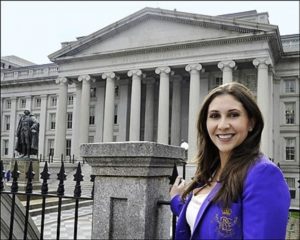 Cuba sanctions draconian. In a panel discussion on North Korea featured on MSNBC, Hagar Chemali (shown in photo at top), a former U.S. Treasury Department official who now runs a consulting firm called Greenwich Media Strategies, said that there was room to tighten sanctions even more against the Kim Jong-un led government. The show’s host disagreed leading to a response from Chemali that brought up the subject of Cuba. She said: “They say that because I don’t think they realize how much room there is left to isolate North Korea. Cuba is far more sanctioned than North Korea.” The writer of the article later quotes a former State Department official who agrees with Chemali claiming that “Cuba is subject to draconian U.S. sanctions.” PolitiFact called the argument half true, which we still don’t understand. (From PolitiFact, July 7. For more of the article,
Cuba sanctions draconian. In a panel discussion on North Korea featured on MSNBC, Hagar Chemali (shown in photo at top), a former U.S. Treasury Department official who now runs a consulting firm called Greenwich Media Strategies, said that there was room to tighten sanctions even more against the Kim Jong-un led government. The show’s host disagreed leading to a response from Chemali that brought up the subject of Cuba. She said: “They say that because I don’t think they realize how much room there is left to isolate North Korea. Cuba is far more sanctioned than North Korea.” The writer of the article later quotes a former State Department official who agrees with Chemali claiming that “Cuba is subject to draconian U.S. sanctions.” PolitiFact called the argument half true, which we still don’t understand. (From PolitiFact, July 7. For more of the article, 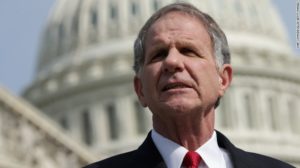
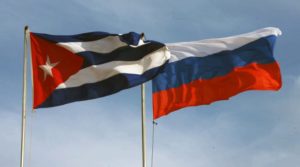
 Farmers and cattlers oppose Trump: Agricultural groups in Illinois are voicing their opposition to Trumps decision to limit trade with Cuba, arguing that it will hinder their ability to sell food to people that need it and have a negative impact on agricultural trade opportunities in the state. Cuba imports 80 percent of its food, according to the Americas Society and Council of the Americas (ASCOA). During a U.S. House Foreign Affairs subcommittee hearing, Republican Ted Poe of Texas said lifting the embargo on Cuba would produce $4.3 billion in agricultural exports and add approximately 6,000 jobs in the United States, according to ASCOA. (The Rock River Times, June 24.
Farmers and cattlers oppose Trump: Agricultural groups in Illinois are voicing their opposition to Trumps decision to limit trade with Cuba, arguing that it will hinder their ability to sell food to people that need it and have a negative impact on agricultural trade opportunities in the state. Cuba imports 80 percent of its food, according to the Americas Society and Council of the Americas (ASCOA). During a U.S. House Foreign Affairs subcommittee hearing, Republican Ted Poe of Texas said lifting the embargo on Cuba would produce $4.3 billion in agricultural exports and add approximately 6,000 jobs in the United States, according to ASCOA. (The Rock River Times, June 24. 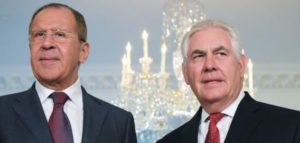 Russia says we’re back to Cold War: The U.S. administration’s new policy towards Cuba is a return to the Cold War, Russia’s Foreign Ministry said in a statement on Sunday. “The new course announced by the U.S. president towards Cuba returns us to the already almost forgotten rhetoric of the Cold War style,” the statement reads. “Such an approach has characterized the U.S. attitude to Cuba for decades. When the previous administration in Washington made considerable changes to the course conducted towards the island, we reasonably believed that this was not so much a manifestation of the goodwill of individual politicians, but a reflection of the failure of the policy of diktat and sanctions against this small and freedom-loving state Now it turns out that the anti-Cuban discourse is still in high demand,” the Foreign Ministry said. The history of the past five decades has shown the futility of the arrogant style in the dialog with Cuba. Russia stands against embargoes, blockades and sanctions against that country and stresses unshakable solidarity with the island, the statement reads. (Click here to read the
Russia says we’re back to Cold War: The U.S. administration’s new policy towards Cuba is a return to the Cold War, Russia’s Foreign Ministry said in a statement on Sunday. “The new course announced by the U.S. president towards Cuba returns us to the already almost forgotten rhetoric of the Cold War style,” the statement reads. “Such an approach has characterized the U.S. attitude to Cuba for decades. When the previous administration in Washington made considerable changes to the course conducted towards the island, we reasonably believed that this was not so much a manifestation of the goodwill of individual politicians, but a reflection of the failure of the policy of diktat and sanctions against this small and freedom-loving state Now it turns out that the anti-Cuban discourse is still in high demand,” the Foreign Ministry said. The history of the past five decades has shown the futility of the arrogant style in the dialog with Cuba. Russia stands against embargoes, blockades and sanctions against that country and stresses unshakable solidarity with the island, the statement reads. (Click here to read the  Bad for business: On Friday, the U.S. Chamber of Commerce decried Trump’s changes. “U.S. private sector engagement can be a positive force for the kind of change we all wish to see in Cuba,” Myron Brilliant, the chamber’s head of international affairs, said. “Unfortunately, today’s moves actually limit the possibility for positive change on the island and risk ceding growth opportunities to other countries that, frankly, may not share America’s interest in a free and democratic Cuba.” Caterpillar, which has long called for the U.S. government to end the trade embargo, also weighed in. The maker of heavy equipment has been working to reenter the Cuban market since the Obama administration reestablished diplomatic relations in 2014. “Caterpillar believes that engagement with Cuba continues to represent a strong opportunity — not just for American businesses, but to serve as a powerful tool for change,” the company said in a statement. “We will continue to work closely with policymakers on the best way to accomplish these goals.” (CNN, June 17.
Bad for business: On Friday, the U.S. Chamber of Commerce decried Trump’s changes. “U.S. private sector engagement can be a positive force for the kind of change we all wish to see in Cuba,” Myron Brilliant, the chamber’s head of international affairs, said. “Unfortunately, today’s moves actually limit the possibility for positive change on the island and risk ceding growth opportunities to other countries that, frankly, may not share America’s interest in a free and democratic Cuba.” Caterpillar, which has long called for the U.S. government to end the trade embargo, also weighed in. The maker of heavy equipment has been working to reenter the Cuban market since the Obama administration reestablished diplomatic relations in 2014. “Caterpillar believes that engagement with Cuba continues to represent a strong opportunity — not just for American businesses, but to serve as a powerful tool for change,” the company said in a statement. “We will continue to work closely with policymakers on the best way to accomplish these goals.” (CNN, June 17. 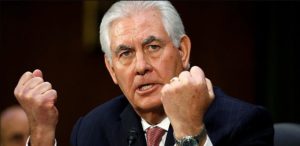
 War on drugs needs a boost: Two Cuban officers in the antidrug front lines have told CNN en Español that they have seen an increase in drug trafficking during the turnover from the Obama administration to Trump’s. “There has been a readjustment,” said Col. Héctor González Hernández, chief of the Antidrug Directorate. “We have evidence that the criminal networks are shifting from trafficking in humans to trafficking in drugs — or both at the same time.” Washington canceled all talks on cooperation with Havana while President Trump reviewed U.S. policy toward the island, the officers said. “We’re waiting to see what happens,” said Col. Victor López Bravo of the Cuban Coast Guard and Border Patrol. “It’s up to the United States to set the next [strategy] meeting and invite us. We hope it happens because it really benefits both countries.” (CNN, June 14. For article in Spanish,
War on drugs needs a boost: Two Cuban officers in the antidrug front lines have told CNN en Español that they have seen an increase in drug trafficking during the turnover from the Obama administration to Trump’s. “There has been a readjustment,” said Col. Héctor González Hernández, chief of the Antidrug Directorate. “We have evidence that the criminal networks are shifting from trafficking in humans to trafficking in drugs — or both at the same time.” Washington canceled all talks on cooperation with Havana while President Trump reviewed U.S. policy toward the island, the officers said. “We’re waiting to see what happens,” said Col. Victor López Bravo of the Cuban Coast Guard and Border Patrol. “It’s up to the United States to set the next [strategy] meeting and invite us. We hope it happens because it really benefits both countries.” (CNN, June 14. For article in Spanish, 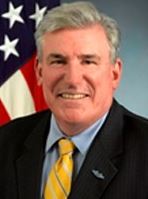 Reversal could hurt U.S. security: Retired Army Gen. David L. McGinnis, one of several former military officers who have lobbied to retain the opening with Cuba, argues that undoing the relationship will pose a threat to national security. He and others said that joint U.S.-Cuba progress on busting human-trafficking rings and interdicting drug-running operations in the waters between the two countries would be badly impaired. Moreover, McGinnis said, there are other powers, like Russia, China and Iran, battling for influence in Cuba as they perceive the U.S. withdrawing. (The Los Angeles Times, June 11.
Reversal could hurt U.S. security: Retired Army Gen. David L. McGinnis, one of several former military officers who have lobbied to retain the opening with Cuba, argues that undoing the relationship will pose a threat to national security. He and others said that joint U.S.-Cuba progress on busting human-trafficking rings and interdicting drug-running operations in the waters between the two countries would be badly impaired. Moreover, McGinnis said, there are other powers, like Russia, China and Iran, battling for influence in Cuba as they perceive the U.S. withdrawing. (The Los Angeles Times, June 11. 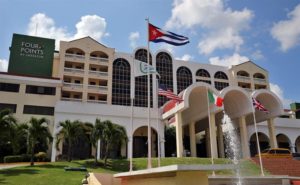 Reality might thwart Trump: Cuban-American members of Congress have been pushing the White House to nullify licenses that U.S. firms such as Starwood and Marriott have struck with Cuba since Obama announced normalization in 2014. Sources say Trump was seriously considering that move until Treasury and State Department officials stepped in and warned of the epic legal battles the White House would face if he did. Since canceling diplomatic relations with Cuba would also be impractical and since curtailing Cuban-American travel and remittances to Cuba could anger a large swath of South Florida Cubans, Trump is left with little more than chipping away at normalization around the edges. For that reason, sources say the Cuban-American legislators are split over whether it’s politically beneficial for Trump to be present in Miami when he announces such modest changes. (WLRN, June 9.
Reality might thwart Trump: Cuban-American members of Congress have been pushing the White House to nullify licenses that U.S. firms such as Starwood and Marriott have struck with Cuba since Obama announced normalization in 2014. Sources say Trump was seriously considering that move until Treasury and State Department officials stepped in and warned of the epic legal battles the White House would face if he did. Since canceling diplomatic relations with Cuba would also be impractical and since curtailing Cuban-American travel and remittances to Cuba could anger a large swath of South Florida Cubans, Trump is left with little more than chipping away at normalization around the edges. For that reason, sources say the Cuban-American legislators are split over whether it’s politically beneficial for Trump to be present in Miami when he announces such modest changes. (WLRN, June 9.  A call for action against rollbacks: Just two-and-a-half years after the United States finally took steps to end more than a half-century of hostility and restrictions on trade and travel, President Trump wants us to go backward. Luckily, theres some momentum pushing back. Lawmakers in Congress recently reintroduced the Freedom to Travel to Cuba Act (Senate Bill 1287). The bipartisan bill now has 55 cosponsors and would guarantee Americans the right to travel to Cuba. We need to expand, not contract, our engagement with Cuba. Here’s how to tell your senators. (The Nation, June 8.
A call for action against rollbacks: Just two-and-a-half years after the United States finally took steps to end more than a half-century of hostility and restrictions on trade and travel, President Trump wants us to go backward. Luckily, theres some momentum pushing back. Lawmakers in Congress recently reintroduced the Freedom to Travel to Cuba Act (Senate Bill 1287). The bipartisan bill now has 55 cosponsors and would guarantee Americans the right to travel to Cuba. We need to expand, not contract, our engagement with Cuba. Here’s how to tell your senators. (The Nation, June 8. 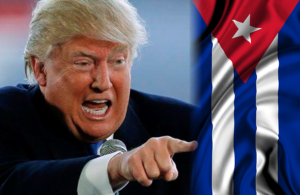
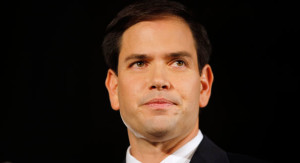 Political Ploy 2: The Cuban American Representative Mario Díaz-Balart (R-Fla.), one of the most vocal critics of Obama’s policy, reportedly extracted a commitment from the White House to be tough on Cuba as the price for his vote to repeal Obamacare. Senator Marco Rubio (R-Fla.), the other main proponent of turning back the clock, sits on the Intelligence Committee investigating the Trump Campaign’s Russian connections. Instead of draining the swamp, the Trump team has apparently decided that to swim in it, you have to feed the alligators. It would be exquisitely ironic if Trump adopted Marco Rubio’s failed Cuba policy in order to curry favor with him in hopes of blunting the Senate’s Russia investigation and by so doing ceded to Moscow a dominant geostrategic position on our doorstep in Cuba. [HuffPost, June 5.
Political Ploy 2: The Cuban American Representative Mario Díaz-Balart (R-Fla.), one of the most vocal critics of Obama’s policy, reportedly extracted a commitment from the White House to be tough on Cuba as the price for his vote to repeal Obamacare. Senator Marco Rubio (R-Fla.), the other main proponent of turning back the clock, sits on the Intelligence Committee investigating the Trump Campaign’s Russian connections. Instead of draining the swamp, the Trump team has apparently decided that to swim in it, you have to feed the alligators. It would be exquisitely ironic if Trump adopted Marco Rubio’s failed Cuba policy in order to curry favor with him in hopes of blunting the Senate’s Russia investigation and by so doing ceded to Moscow a dominant geostrategic position on our doorstep in Cuba. [HuffPost, June 5. 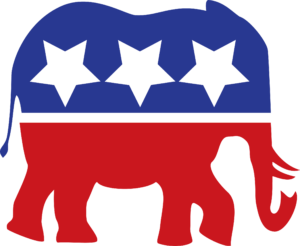 Republicans push back: Multiple congressional and advocacy organization sources say the Trump administration is now looking to push an executive order that would change a number of regulations that could affect American citizens’ increased access to Cuba. The plans could face a stumbling block in the form of the 54 senators who support lifting the U.S. trade embargo entirely. (Daily Mail, June 4.
Republicans push back: Multiple congressional and advocacy organization sources say the Trump administration is now looking to push an executive order that would change a number of regulations that could affect American citizens’ increased access to Cuba. The plans could face a stumbling block in the form of the 54 senators who support lifting the U.S. trade embargo entirely. (Daily Mail, June 4. 
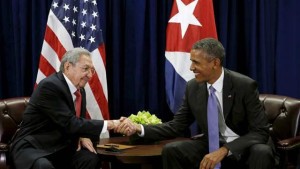 On the cutting board: A New York Times editorial clearly states: “To the long list of Barack Obama’s major initiatives that President Trump is obsessed with reversing, we may soon be able to add Cuba.” It goes on to say that “Soon after his election, Mr. Trump declared, vaguely but ominously, that if Cuba did not ‘make a better deal” he would “terminate deal.’ He gave no specifics and no decisions have been announced. But details of what a policy reversal could look like are emerging.” (New York Times, June 5.
On the cutting board: A New York Times editorial clearly states: “To the long list of Barack Obama’s major initiatives that President Trump is obsessed with reversing, we may soon be able to add Cuba.” It goes on to say that “Soon after his election, Mr. Trump declared, vaguely but ominously, that if Cuba did not ‘make a better deal” he would “terminate deal.’ He gave no specifics and no decisions have been announced. But details of what a policy reversal could look like are emerging.” (New York Times, June 5. 